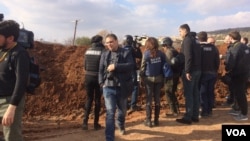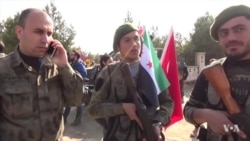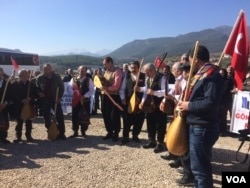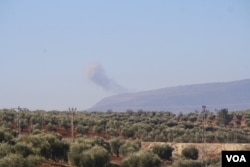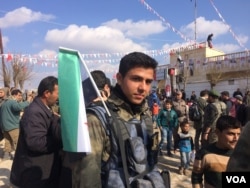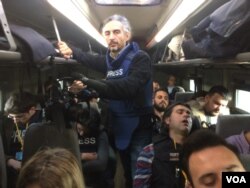As our white armored bus rumbles across the Turkish border into Syria, the roads become muddy as journalists snap pictures of the war-torn countryside. This bus, and the one in front of us, is packed.
We are on a tour arranged by the Turkish government of the outskirts of Afrin, where their forces have been fighting Kurdish forces for nearly two weeks. The bus drivers are Syrian policemen, who currently live in refugee camps.
When we arrive at our first stop, the town of Soran, a rally is already under way. It is in support of the battle, officially called "The Olive Branch Operation."
WATCH: Turkish forces are on the move
Hope for better future after dark past
The people we meet include soldiers from the Free Syrian Army, an opposition military now allied with the Turkish forces against the Kurdish forces. They tell us they are fighting for the protection of their families and futures, and the unity of Syria.
"Our goal is to delete them, as we did Islamic State militants," says Fadel Lamone, a FSA commander who farmed potatoes, olives and other vegetables before the Syrian civil war begin in 2011.
Kurdish forces also fought IS with the support of the United States. But on this side of the front lines, we cannot ask Kurdish people in Afrin what they think. A quick scan of Kurdish news finds reports of civilian deaths and the general belief that the people of Afrin are under attack.
At the rally, men wrapped in flags of the FSA lead children in chants, shouting, "Turkey and Syria are one!" Other men wave Turkish flags in the background.
"This battle is for our children's future," says Ghuda, a mother and local policewoman whose husband, an FSA fighter, was killed in battle. Her town is safe now, she says, but she remembers a time when it was briefly overrun by IS militants and fears Kurdish forces will attempt to expand. "We only want peace," she adds.
On the other side
On Wednesday, Turkish supporters on the other side of the border said they have similar goals. They don't want Kurdish forces, whom they say are part of a terrorist organization that has killed tens of thousands of people in decades of attacks, so close to their borders.
"They are killing our children, we don't want this blood anymore," said Mustafa Karslioglu, at a pro-government demonstration on a hillside overlooking the mountains around Afrin. Earlier that day in Reyhanli, Turkey, four bombs had been lobbed over the border from Syria, killing at least one teenage girl.
At the demonstration, supporters blamed the U.S. for much of their trouble, saying U.S. arms and training has made their foes stronger and more of a threat. If the battle moves on to Manbij, Syria, farther east, Turkey will be fighting directly with U.S.-supported Kurdish fighters. U.S. troops are currently stationed in Manbij, as well.
The road back to Turkey
But at the rally in Soran, locals say they are not interested in the shaky alliance between Turkey and the U.S.
"That's a political question between nations," says Omar al-Wesi, a Syrian police commander. "Before Turkey came into this area, we were in crisis. Now our population is booming, with new schools and hospitals."
Press officials soon gather the two busloads of journalists, and we pile back in with our cameras poised. On some roads, we can travel no more than 16 kph (10 mph) and many reporters eventually drift off to sleep.
About an hour later, we are hoping to be heading to the hills that over look the battles. But a press officer in a flak jacket boards the bus and tells us it is too dangerous right now, so we will stop in a nearby village.
A few minutes later, presenters and cameramen jump out of the buses and race up to what appears to be a raised strip of land. Behind them are two mountainsides.
Our drivers tell us one hill is occupied by PKK fighters, Kurdish militants designated by both Turkey and the U.S. as terrorists. The other had been captured a week ago by Turkish forces, with the help of the FSA.
The Kurdish fighters who are battling the IS jihadists in Syria are regarded by the United States as its most reliable partners there. But to Turkey, a NATO ally of the United States, these Kurds are an extension of the PKK.
About 20 minutes later, we hurry back into the bus, taking our final glimpses at the embattled country before heading back into Turkey.




